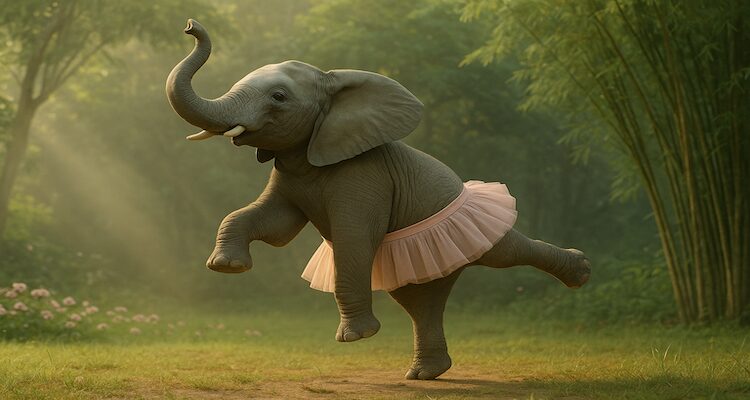The Elephant Who Wanted to Learn Ballet

Discover The Elephant Who Wanted to Learn Ballet, a whimsical children’s story about courage, kindness, and following your dreams.
Deep in a green, sunlit valley where the river curled like a silver ribbon, lived a young elephant named Eko. Eko was strong, gentle, and curious. He loved the smell of wet leaves after rain and the feel of soft mud between his toes. Most elephants liked to splash, trumpet, and tug leaves from tall trees. Eko liked those things too, but there was something else he loved even more: music.
Every evening, when the sun slid behind the mango hill, the forest filled with sounds crickets chirping, frogs humming, and the wind rustling through bamboo. Eko would sway to the rhythm, lifting one foot, then another, imagining he could float like a feather. One night, he saw something marvelous. At the edge of the river, a flamingo stood on one slender leg, twirling slowly, wings spread wide. She moved with such grace that the moon itself seemed to pause and watch.
Eko stepped closer, trying not to splash. “Hello,” he said in a shy rumble. “I’m Eko. What are you doing?”
The flamingo bowed. “I am Madame Luma,” she said. “I am practicing ballet.”
“Ballet,” Eko breathed, tasting the new word like a spoonful of honey. “Can… can elephants learn ballet?”
Madame Luma’s bright eyes sparkled. “Anyone with a heart that listens to music can learn to dance.”
Eko’s ears flapped with joy. “Then I want to learn! I want to dance ballet.”
The very next morning, Eko told his friends. “I’m going to learn ballet!” he announced.
The monkey twins chattered with surprise. “But your feet are so big!”
Piku the porcupine blinked. “Won’t the ground shake?”
A shy tortoise peeped from his shell. “It sounds hard.”
Eko’s cheeks warmed, but he lifted his chin. “I know I am big,” he said kindly, “but my heart is big too. And it wants to dance.”
Madame Luma agreed to be his teacher. She chose a quiet clearing where pink flowers drooped like tiny bells. “Ballet begins with balance,” she said. “Stand tall. Feel the earth holding you.”
Eko planted his feet and took a deep breath. He tried to balance on three feet, then two. He wobbled. He wiggled. He wobbled again. The monkey twins giggled from a branch, and Piku’s whiskers twitched.
Madame Luma clicked her beak. “No laughing. Ballet asks for courage and kindness. We cheer for brave tries.”
The monkeys tucked their tails, and Piku lowered his quills. Eko smiled with thanks and tried again. This time, he imagined his legs growing roots, like a tree. He felt the earth under him, solid and kind. He lifted one foot and held it. Only for a heartbeat, but he did it.
“Bravo,” said Madame Luma. “Now, we learn to move.”
They practiced every day. Eko learned how to bend his knees in a small plie. He learned to point his toes in the water, where the river held up his weight and taught him to float. He learned how to turn slowly, following the moon with his eyes so he didn’t get dizzy. When he danced, the wind seemed to whisper, the bamboo seemed to sway, and the frogs hummed a gentle beat.
Not every day was smooth. Some days, Eko’s feet felt like stones. Some days, he stepped on a twig and snapped it with a loud crack! Some days, a cloud of butterflies flew by and he lost his focus, watching their painted wings. On those days, he took an extra deep breath, remembered the steady earth, and tried again.
News of the dancing elephant drifted through the forest like birdsong. Most animals were friendly and curious. A few were not. A young jackal scoffed at the riverbank. “Ballet? For an elephant? What a silly dream.”
Eko’s ears drooped, but Madame Luma’s voice was firm. “Dreams are not silly. They are seeds. Water them with practice, and they grow.”
To help Eko, the forest gathered. The tortoise heaved himself onto a smooth rock and tapped a slow, steady beat with his shell. The crickets tuned their chirps like tiny violins. The monkey twins learned to clap in time. Even the porcupine found a palm leaf that made a soft, shushing sound when he brushed it with his quills.
“Listen,” Madame Luma said, lifting a wing. “Ballet is not only steps. It is story. What do you want your dance to say?”
Eko thought. He remembered the mango hill, the cool river, the steady earth. He remembered feeling different and afraid and then brave. He looked at his friends, all shapes and colors, all helping in their own way.
“I want my dance to say that being yourself is beautiful,” Eko said. “And that big hearts can be gentle.”
Madame Luma nodded, pleased. “Then we will create a new piece: ‘The Ballet of the Big Heart.’”
They built the dance together. First came the “River Step,” a slow glide learned from water. Then the “Mango Sway,” a side-to-side motion like the trees in wind. There was a turn called the “Moon Circle,” small and careful, following a silver line in the air. And there was the “Kindness Bow,” where Eko bent low and opened his ears wide, as if hugging the audience with sound.
Day by day, the dance grew. Eko practiced in the pink-flower clearing until the petals fell and made a soft, fragrant carpet. He practiced by starlight, when fireflies lit up like tiny lamps and the frogs sang. He practiced in the rain, feeling the rhythm of drops.
Then came the Rainforest Festival, held every year when the first big storm cooled the air. Animals gathered from far and near. Parrots flashed like flying flags. Deer stepped lightly on moss. A family of otters passed fish-shaped cookies made of sweet river rice. The air buzzed with excitement.
On the main stage a wide, flat stone polished by centuries of river talk performers lined up. There were drummers, singers, and dancers. When Madame Luma’s name was called, she stepped onto the stone with Eko beside her. A murmur traveled through the crowd.
Madame Luma raised a wing. The forest hushed. The tortoise tapped a slow beat. The crickets joined, then the shushing leaf, then the soft claps from the monkey twins. Eko took his first breath and felt the earth under him, steady and kind.
He began with the River Step. He glided, surprising everyone with how gently he could move. He flowed into the Mango Sway, silent as breeze through leaves. He lifted his trunk in a graceful curve, tracing the Moon Circle with quiet focus. The audience leaned forward, eyes bright. Even the jackal watched, his mouth slightly open.
In the middle of the dance, a gust of wind shook the bamboo, sending a swirl of petals onto the stage. For a heartbeat, Eko blinked petals tickled his eyelashes! and his foot slipped. His heart thumped hard.
He remembered Madame Luma’s lesson: When you wobble, return to your roots. Eko placed his foot, felt the earth, and steadied. He turned the slip into a new step a gentle, petal-skimming sweep and the crowd sighed with wonder, as if it had been planned all along.
At the end, Eko performed the Kindness Bow. He bent low, ears open, heart wide. The forest was silent for a sparkling moment. Then the valley erupted in cheers. Parrots wheeled in delight. The otters clapped their paws. The tortoise thumped a proud drumbeat. Madame Luma bowed to Eko, her eyes shining.
“You were brave,” she said softly. “You were yourself. That is true ballet.”
The jackal approached, tail drooping. “I was wrong,” he said, looking at his paws. “Your dancing isn’t silly. It’s… beautiful. I’m sorry for my words.”
Eko lifted him with a gentle trunk hug. “Thank you,” he said. “Would you like to learn a step?”
The jackal’s eyes widened. “Me?”
“Anyone with a heart that listens to music can learn to dance,” Eko said, repeating Madame Luma’s wisdom. The monkey twins nodded. The porcupine offered his shushing leaf. The tortoise tapped a friendly beat. Soon the whole clearing swayed together tall, small, furry, feathery, prickly, and smooth moving to one kind rhythm.
From that day, Eko taught a free class by the river at sunset. Some students wanted to dance on stage. Others wanted to move for joy. Eko showed them how to balance, how to listen, and how to shape a wobble into something graceful. He reminded everyone that big bodies can be gentle, small bodies can be strong, and every body can tell a story.
And whenever the moon rose over the mango hill, you could see an elephant standing tall, ears open like wings, feet steady as trees, dancing a ballet that belonged to the forest and to his big, brave heart.
(Moral: Be kind, be brave, and be yourself—practice turns doubts into dances.)
Also Read: Tara and the Pocket-Sized Planet










